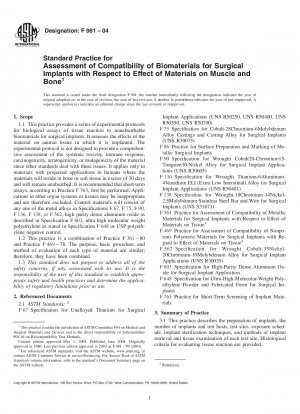ASTM F981-04
Standard Practice for Assessment of Compatibility of Biomaterials for Surgical Implants with Respect to Effect of Materials on Muscle and Bone
- Standard No.
- ASTM F981-04
- Release Date
- 2004
- Published By
- American Society for Testing and Materials (ASTM)
- Status
- Replace By
- ASTM F981-04(2010)
- Latest
- ASTM F981-23
- Scope
This practice covers a test protocol for comparing the local tissue response evoked by biomaterials, from which medical implantable devices might ultimately be fabricated, with the local tissue response elicited by control materials currently accepted for the fabrication of surgical devices. The materials may include metals (and metal alloys), dense aluminum oxide, and polyethylene that are standardized on the basis of acceptable long-term well-characterized long-term response. The controls consistently produce cellular reaction and wound healing to a degree that has been found to be acceptable to the host.
1.1 This practice provides a series of experimental protocols for biological assays of tissue reaction to nonabsorbable biomaterials for surgical implants. It assesses the effects of the material on animal tissue in which it is implanted. The experimental protocol is not designed to provide a comprehensive assessment of the systemic toxicity, immune response, carcinogenicity, teratogenicity, or mutagenicity of the material since other standards deal with these issues. It applies only to materials with projected applications in humans where the materials will reside in bone or soft tissue in excess of 30 days and will remain unabsorbed. It is recommended that short-term assays, according to Practice F 763, first be performed. Applications in other organ systems or tissues may be inappropriate and are therefore excluded. Control materials will consist of any one of the metal alloys in Specifications F 67, F 75, F 90, F 136, F 138, or F 562, high purity dense aluminum oxide as described in Specification F 603, ultra high molecular weight polyethylene as stated in Specification F 648 or USP polyethylene negative control.
1.2 This practice is a combination of Practice F 361 - 80 and Practice F 469 - 78. The purpose, basic procedure, and method of evaluation of each type of material are similar; therefore, they have been combined.
1.3 This standard does not purport to address all of the safety concerns, if any, associated with its use. It is the responsibility of the user of this standard to establish appropriate safety and health practices and determine the applicability of regulatory limitations prior to use.
ASTM F981-04 Referenced Document
- ASTM F136 Standard Specification for Wrought Titanium-6 Aluminum-4 Vanadium ELI (Extra Low Interstitial) Alloy (UNS R56401) for Surgical Implant Applications
- ASTM F138 Standard Specification for Wrought 18 Chromium-14 Nickel-2.5 Molybdenum Stainless Steel Bar and Wire for Surgical Implants (UNS S31673)
- ASTM F361
- ASTM F469
- ASTM F562 Standard Specification for Wrought 35Cobalt-35Nickel-20Chromium-10Molybdenum Alloy for Surgical Implant Applications (UNS R30035)
- ASTM F603 Standard Specification for High-Purity Dense Aluminum Oxide for Surgical Implant Application
- ASTM F648 Standard Specification for Ultra-High-Molecular-Weight Polyethylene Powder and Fabricated Form for Surgical Implants
- ASTM F67 Standard Specification for Unalloyed Titanium for Surgical Implant Applications (UNS R50250, UNS R50400, UNS R50550, UNS R50700)
- ASTM F75 Standard Specification for Cobalt-28 Chromium-6 Molybdenum Alloy Castings and Casting Alloy for Surgical Implants (UNS R30075)
- ASTM F763 Standard Practice for Short-Term Screening of Implant Materials
- ASTM F86 Standard Practice for Surface Preparation and Marking of Metallic Surgical Implants
- ASTM F90 Standard Specification for Wrought Cobalt-20 Chromium-15 Tungsten-10 Nickel Alloy for Surgical Implant Applications (UNS R30605)
ASTM F981-04 history
- 2023 ASTM F981-23 Standard Practice for Assessment of Muscle and Bone Tissue Responses to Long-Term Implantable Materials Used in Medical Devices
- 2004 ASTM F981-04(2016) Standard Practice for Assessment of Compatibility of Biomaterials for Surgical Implants with Respect to Effect of Materials on Muscle and Insertion into Bone
- 2004 ASTM F981-04(2010) Standard Practice for Assessment of Compatibility of Biomaterials for Surgical Implants with Respect to Effect of Materials on Muscle and Bone
- 2004 ASTM F981-04 Standard Practice for Assessment of Compatibility of Biomaterials for Surgical Implants with Respect to Effect of Materials on Muscle and Bone
- 2003 ASTM F981-99(2003) Standard Practice for Assessment of Compatibility of Biomaterials for Surgical Implants with Respect to Effect of Materials on Muscle and Bone
- 1999 ASTM F981-99 Standard Practice for Assessment of Compatibility of Biomaterials for Surgical Implants with Respect to Effect of Materials on Muscle and Bone
